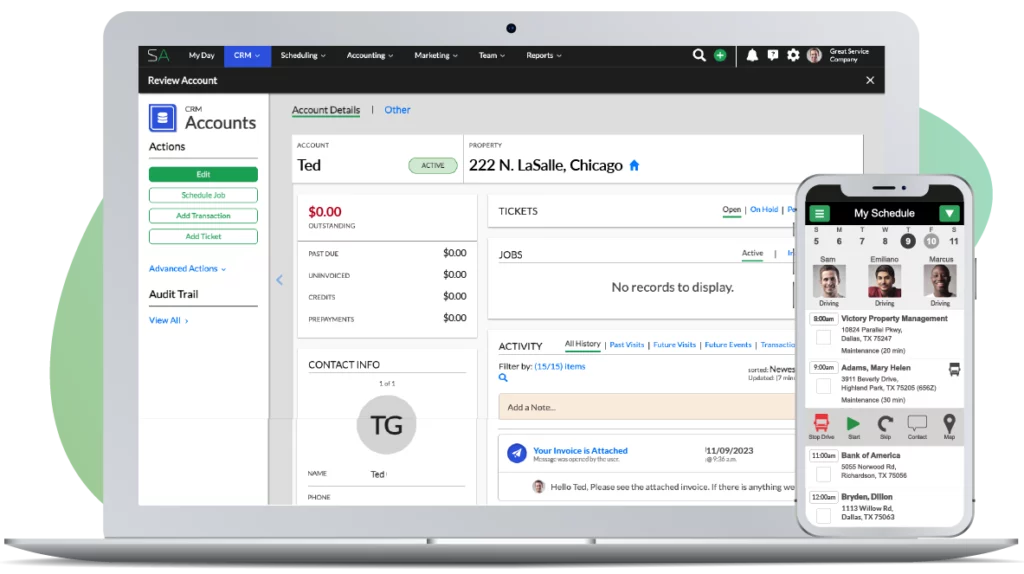Video Transcript…
“My question is, how do I build a business when competitive pricing is based on illegal, cheap labor? The average quarter acre lot is mowed for $25, half an acre for 35 and an acre for 45-55 in my area. At these prices, how do I legally hire people and do the work and still make money. I live in Illinois where the taxes add up to 25%.”
The question is one that I receive all the time. What I’ve found when somebody refers to illegal workers, which we’ll just call undocumented workers, I don’t always find that undocumented workers equal cheap labor. I realize that’s out there, but I think the reality of it is that the prices are being suppressed because people are selling work cheap.
The reason they’re selling work cheap is because of two reasons. One, there is a ridiculously low barrier of entry in this business. Anybody can buy a lawnmower and be in business. Then, they don’t know what they’re doing. They don’t know how to run a business, they don’t know how to price, they look around at what everybody else is doing and they sell work at that same price.
The other reason that pricing is incorrect, in many markets, is because all of us at times are under pricing. You have a smart guy that knows a thing or two about business, and knows a thing or two about making money. He enters the market and he’s still under pricing work because he has a lot of lessons to learn.
Underpricing is, across the board, an issue. Take a look at the cleaning industry and some other industries.
Rates, wages, and employee wages are not going up. They’re the same as they were years and years and years ago. The reason for that is based on several factors, but there is price suppression in most every market. There’s a few ways that you escape this. I gave you a couple reasons why this is happening.
I, personally, don’t attribute it to undocumented workers. I think that’s part of it. But to me, it’s inconsequential. There are many other reasons. The real reasons, as I said, are that it’s so easy to start in this business and there’s no requirement for licensing.
We all at times, again, are under pricing. We as business owners make mistakes. We as business owners tend to copy what other people are doing. These are just a few of the many reasons why prices are suppressed.
Now, you can win this game. The way you win this game is, you differentiate yourself in a major way. The problem is that most companies only know how to market and speak in regards to price. Everything is about price. The decision is price. Somebody says, “Hey I need to get my lawn mowed. What do you charge?”
“I charge 25 bucks.”
“Oh, okay. That’s too high.” Or the homeowner, or the person, says “Oh, no. That’s too low.”
What kind of conversation is that? You just quote a price. They know nothing about you except that you are just like everybody else. I’m not in any way saying that this is what you’re doing. I’m just saying you have to really re-position this and you’ve got to play a different game. It takes years to build this.
The way you build it is through the language you use when you answer the phone. You shift the conversation away from just price. You shift the conversation toward what kind of benefit they’re looking for, what kind of problems they have had in the past. I can’t tell you how many times we get calls at our company. Somebody will call us and we’ll quote some price.
Let’s say we quote 40 bucks. They’ll say “Oh, that’s too much. I get it done for 28.” But two minutes earlier they told us the guy let their dog get out of the fence, they scalped the yard, they do a terrible job, they never answer the phone, on and on and on. They never bill on time. Then they say “Hey, you need to match this price.”
Well, that’s insane. I can’t match that price because I do everything different than the company you dislike. How do you have that kind of conversation? That’s the reason I just said all of that. How do you re-position the conversation and address it like a sales person would, and say “Wait a second.”
You wouldn’t use the words ‘wait a second’, but you would re-position. Say, “Wait. Here’s why I can’t do it for $28. Here’s why I have to charge X. Here’s the difference you’ll experience. The problem where your dog got out, how much money did that cost you?”
Not saying you go through it like that, but that’s the thought process. Your team in the office and your team in the field has to talk a different way, dress a different way, act a different way, look a different way. Trucks have to be different. Your marketing has to be different.
Everything about you, your attitudes, the way you address reviews on the Internet, the way you ask for referrals, the way you ask a client if they would like to buy more work from you, the way you care for a client’s yard, the way you tell them about things that you’ve observed that they need to do, things they need to watch out for, everything has to be different.
It’s a culmination of fifty thousand different little parts that create an incredibly interesting business that looks different to your clients, and acts different to your clients. Then they’re willing to pay more money.
TrueGreen, in many markets, overprices compared to the vast majority of the market. Yet, TrueGreen is huge. There are tons of examples. Scott’s, now, their pricing can be up and down. Sometimes it’s underpriced, sometimes it’s overpriced. But, there’s tons of examples where they’re selling at higher prices than market and they’re winning the business.
They have a huge cost structure compared to everybody else. Well, they’re selling at higher prices and they’re the dominant player. There is absolutely price sensitivity. The way you overcome it is, you talk just in terms of price.
The last part of this is, you have to be very focused on getting as much cost out of your business. I think you take care of your employees because your employees make or break your entire company. I don’t think you underpay your employees. That is not where you cut costs, but you become a ridiculously efficient company.
Great example is if you sell flower work, and you’re a maintenance company. Are you putting out flowers randomly as somebody calls in and asks for flowers installed? So, you run and you get flowers. You put those in and then a day from now somebody else needs flowers. You go and buy flowers. Same could be true with mulch.
You’re not batching together all your flower and mulch work into a few days of the week, or a week of the month, or whatever. You’re not being very organized or systematic. And, you’re not having all your flowers delivered at one time, maybe to the job sites, or maybe to one location. You need to be doing all your flower jobs at one time. That’s just one example of batching work up and thinking in an optimal manner.
How are you maintaining your equipment? How are you doing so many different activities inside your business? Have you looked at the cost of maintenance? Have you looked at the different cost structures of the kind of trucks you’re running? Have you looked at how you’re getting your trucks painted and lettered? Are you looking at every element of your business and figuring out where you can shave cost and create a better company?
That’s what it takes to be competitive in every single industry in this country. You look at Home Depot’s and Lowe’s. How many companies have they put out of business because those guys came in and were ridiculously efficient? They are very cost conscious. They also provide a different service. A one stop shop, compared to the old way of doing things where you had to go to multiple little hardware stores.
Think about all of that and you can overcome it. I guarantee in Illinois, it’s no different or worse for me than it is in Texas. We are in probably one of the most competitive markets in the United States, with tons of undocumented workers coming across the border. We don’t hire undocumented workers.
Consider those things and realize that there’s a whole lot of guys out there, and a whole lot of companies that are successful in spite of this stuff. But yes, they are having to work really hard. I hope this doesn’t come across negative. I hope it’s more encouraging.
The point is that you can totally succeed. You can totally win at this game. You’re just going to have to be a smart business person. Educate yourself. Read some books. I would say, put the thought of this out of your mind because it’ll suck the energy out of you and it will wear you down to the point where you don’t feel like trying. I’m telling you, this can totally be overcome!
It’s going to take a couple years, and it’s going to take some hard work to make sure your image, your internal language, is just right. When that happens, you’ll be able to sell a lot of work and you’ll be able to charge higher prices, and you’ll be able to out-compete your market.
Good luck.




3 Replies to “Competing Against Competitors Using Cheap Labor? Consider these points.”
I really like how you wrote that, I love my career and have my own buisness. I get that so much by different customers who wants me to take of there lawn or do their flower beds for them. The customers don’t like the other person’s work but wants me to do their lawn or flower beds at the person they previously had at their cost. I do care about my work and have went to college graduated for horticulture / lawn care maintenance. I have a hard time talking to customers because some will fly off the handle and call me rip off because I charge more but yet there are flaws on the other service they had. Thank you, this does help me on my of thinking. Sincerely, Mike Armstead
I took that advice above and now we getting $65 an $75 . For sam lawns neighbors co doing that 25 and 35 still for it is marketing to the .people that have good paying jobs and have an image to keep of a Great looking place. When they get home
Nicely said!
Very true